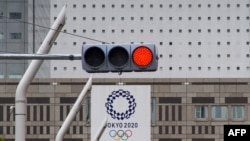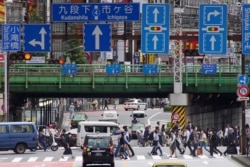A Japanese newspaper is reporting that potential spectators of the Tokyo Olympics will either have to show proof they received a COVID-19 vaccine or tested negative for the virus.
On Monday, government officials are considering to impose other measures such as banning eating, loud cheering and exchanging high-fives, the Yomiuri Shimbun reported.
Reports of restrictions will likely cast a further cloud over the upcoming Olympics, observers say, which are facing growing public opposition amid a new wave of COVID-19 infections across Japan and a slow rate of vaccinations. Tokyo and several other regions in Japan are under a state of emergency that was set to expire Monday, but have been extended until June 20, just a little over a month before the opening ceremonies.
Foreign spectators have already been barred from attending the Olympics.
The Tokyo Olympics are set to take place after a one-year postponement as the novel coronavirus pandemic began spreading across the globe. But a new public opinion survey published Monday by the Nikkei newspaper revealed over 60% of those asked want the games to either be delayed again or outright cancelled, compared to just 34% in favor of holding the event as scheduled.
The Asahi Shimbun newspaper, a major sponsor of the Tokyo Games, issued an editorial last week calling for the event’s cancellation due to the worsening COVID-19 crisis, the first major Japanese newspaper to do so. The Tokyo Medical Practitioners Association, which represents about 6,000 primary care doctors and hospitals, has also called on Prime Minister Yoshihide Suga to convince the International Olympic Committee to cancel the games.
New restrictions in South Africa
In South Africa, new coronavirus restrictions are set to take effect on Monday as it deals with a growing number of new infections.
President Cyril Ramaphosa announced Sunday that a nighttime curfew will take effect at 11 p.m. local time, forcing all non-essential businesses such as restaurants, bars and fitness centers to close an hour earlier. All gatherings will be limited to a maximum number of 100 people indoors and 250 outdoors.
South Africa posted 4,515 new cases over the last 24 hours Monday, and an average of 3,745 new infections over the last seven days, while just 963,000 people, less than one percent of its 60 million citizens, have been vaccinated, according to data report on the Johns Hopkins Coronavirus Resource Center. Experts warn that the current wave of new COVID-19 cases could worsen with the upcoming Southern Hemisphere winter season.
Johns Hopkins is reporting more than 170.3 million global coronavirus infections, including over 3.5 million deaths. The United States is leading in both categories with 33.2 million total cases and 594,431 deaths.






